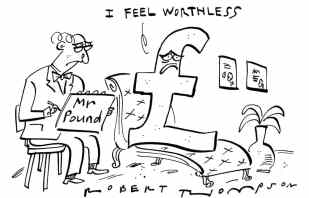‘Club’ is a four-letter word. Whenever a club is mentioned in the press, it will inevitably be portrayed as a sinister meeting place where men gather in secret to plot against the common weal.
If only. The main point about all clubs is that they are fun. That is true in St James’s. It is also true in the working-men’s clubs of the north and Midlands. That said, the Carlton Club could claim to be a special case, although anyone entering its portals in the hope of coming across louche behaviour would be disappointed (almost always).

But it could be regarded as a trustee of the Conservative party. As such, it has provided the setting for crucial events, most notably in 1922. Then, the Conservative Parliamentary Party met at the Carlton – in a previous building – and decided to dispense with Lloyd George. His amorality had become too much for decent men to stomach. One might be tempted to make a comparison with the present leadership, yet that would be unfair. Lloyd George had some redeeming qualities.
Anyway, some of us met at the Carlton, in search of fun, serious wine and talk which also lapsed into seriousness but with plenty of light relief. Walpole said that he liked to talk bawdy at his dinner table because anyone could then join in. He was a Whig, and therefore unsuited to be a vade mecum for Tories – though he could have made a stalwart in any whips’ office. But we all needed to escape from the chaos of current events.
One of our number has a favourite phrase which he has almost turned into a cliché. But no apothegm gains cliché status unless it has something to convey. He compares present-day Britain to the Austro-Hungarian Empire in its final phase, on the eve of 1914. The parades were magnificent. The uniforms were resplendent. In Vienna, the pageantry expressed Imperial grandeur in excelsis. But there was a problem, expressed in his cliché. ‘Away from the parade-ground, nothing worked.’
It would be unfair to claim that nothing works in modern Britain. In the wider economy, outside the public sector bubble, there are still plenty of world-class performances. But a prime minister who has no notion of truth and who has chosen a cabinet full of weaklings cannot provide the leadership which the public sector needs. Left to themselves, having to take the decisions which weak ministers shirk, civil servants choose risk-aversion and over-regulation. They cannot be blamed, especially now that it almost appears as if the PM’s only dealings with officials are when he is deciding whether to lie about what they told him, or pretend to have forgotten all about it.
We found an antidote to gloom in modern Bordeaux
We found an antidote to gloom in modern Bordeaux, where there is no problem in finding bottles that work. We started with a Léoville-Barton ’05, a wine worthy of that late and great wine-maker Antony Barton. It was almost at its peak. So was an ’09 Clarence de Haut-Brion, the second wine of Haut-Brion. Second in line it may be, but it had the port and carriage of a first growth. Although the salvation of the Tory party will need more than splendid claret, it is a superb tonic for the martial spirits.






Comments